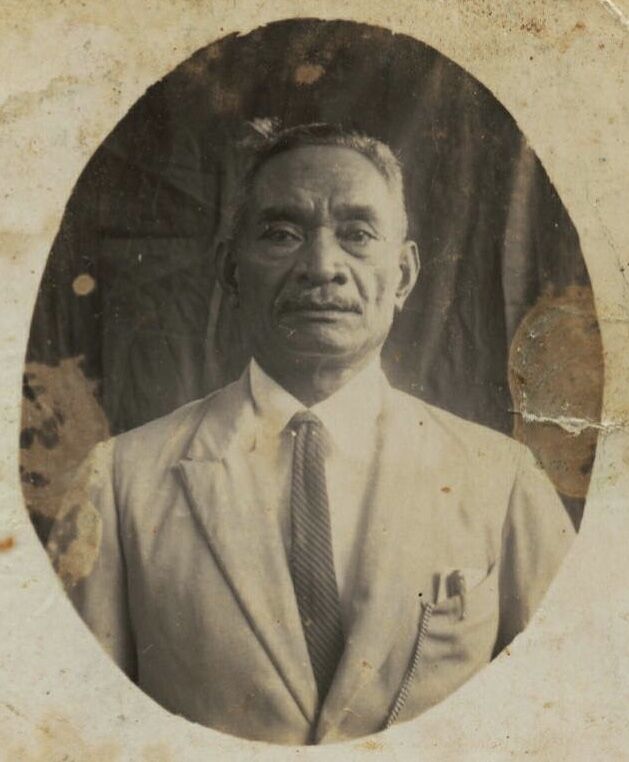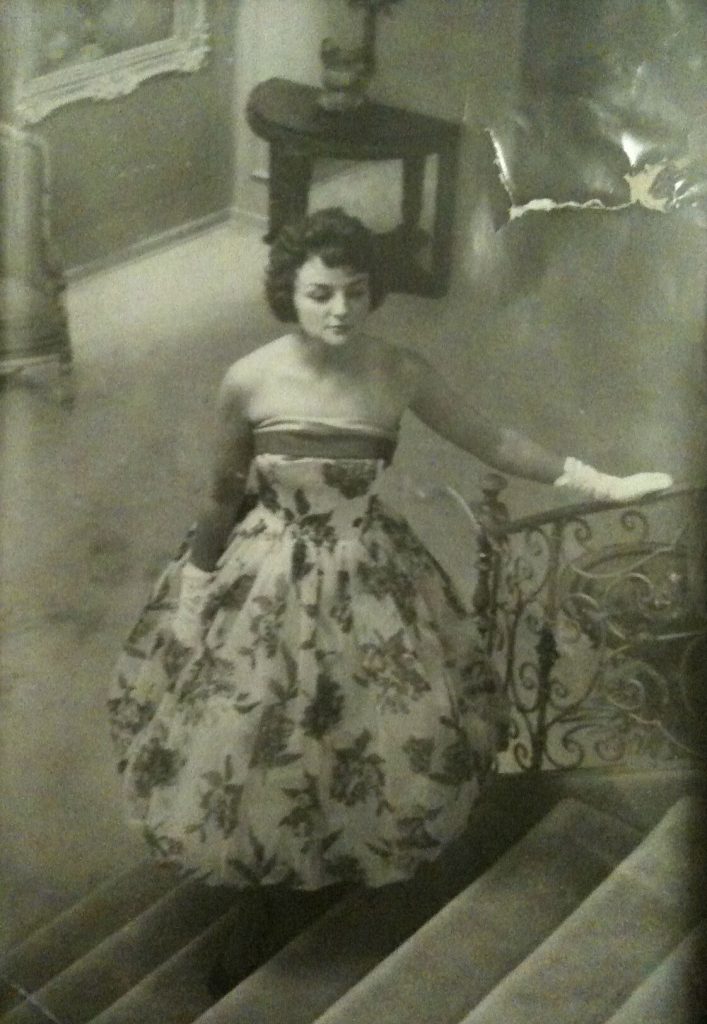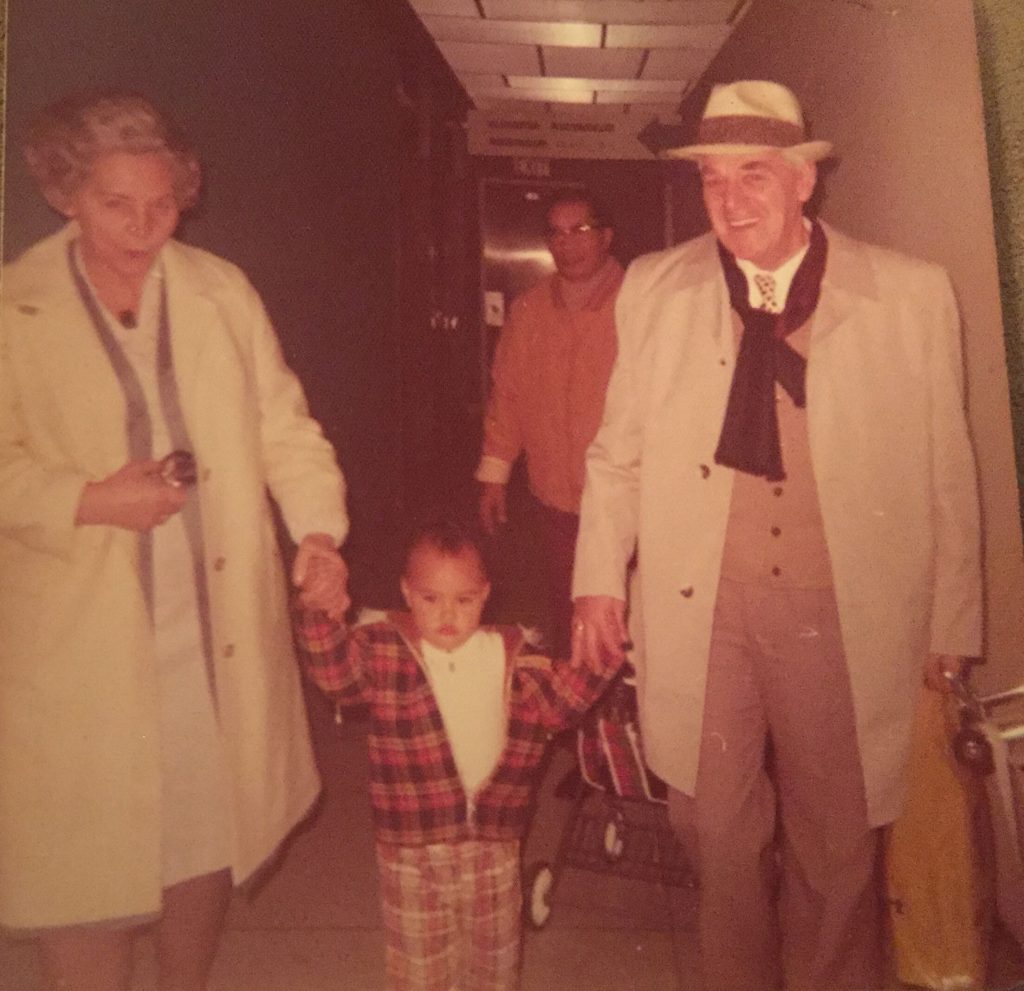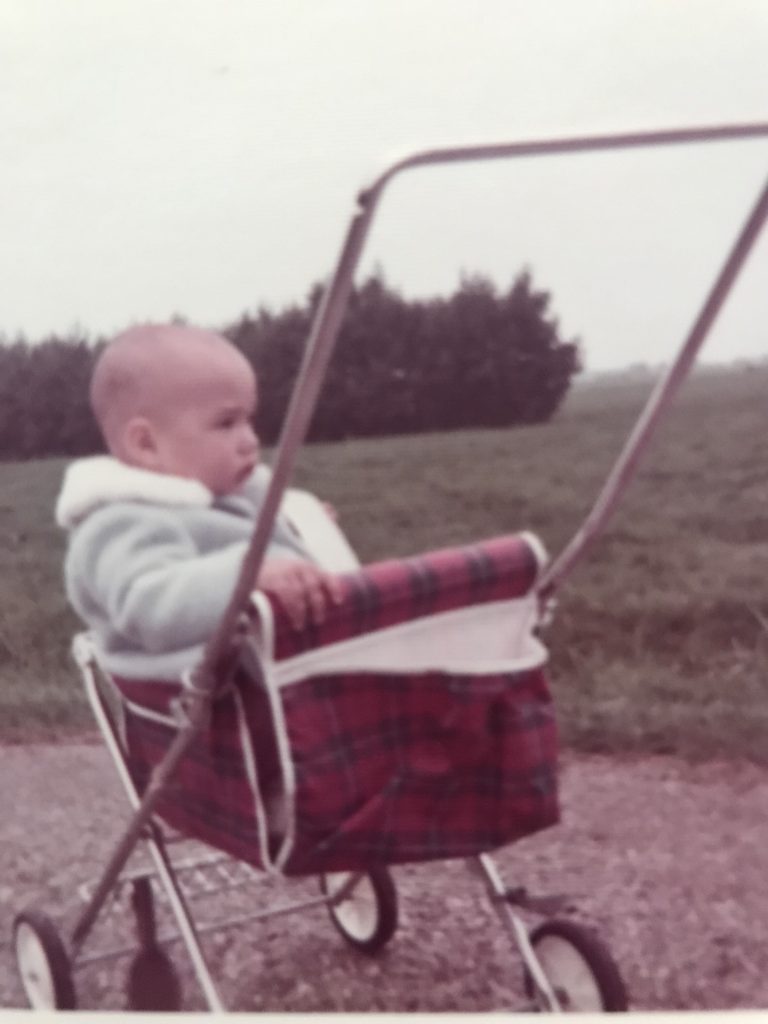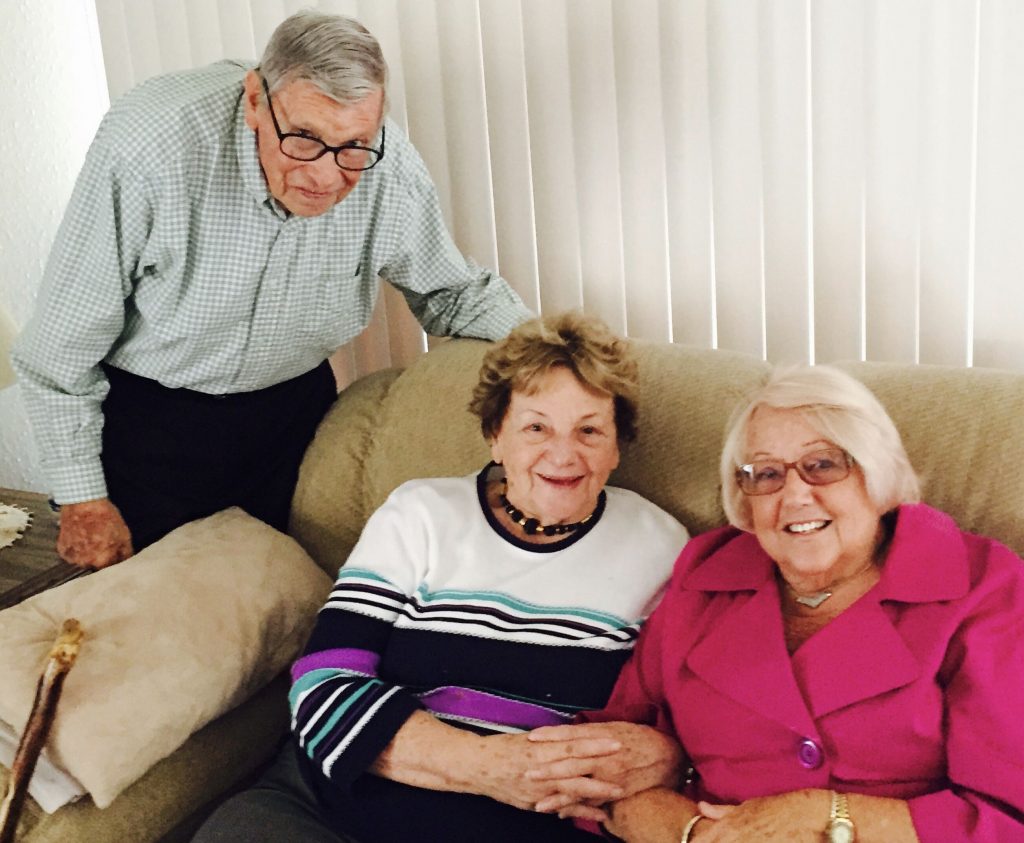I’m Jenifer Leidelmeijer and I am a first-generation Dutch-Indonesian Mexican American also referred to as a “Latindo”. I grew up establishing multiple identities to maneuver through my diversified world as a child of immigrants, my father, Robert, is from the Netherlands and Mother, Maria, is from Mexico. For my parents and relatives, assimilating into the American culture was highly sought, however, preserving our cultural traditions was also important. So, I was raised in a melting pot culture full of flavorful food, vibrant music, and several celebrations including the Holland Festival, Maluku Picnics, New Years/Ano Nuevo, Navidad, and Posadas, family reunions, and joyful birthdays.
My late Opa, Hans Leidelmeijer, was passionate about decoding our family lineage. He left us with a family tree that included 8 generations of the Leidelmeijer lineage. Thanks to my Opa’s efforts, I had a strong foundation to help create my own family tree on FamilySearch.org. After many dedicated hours of research, I now have a robust family history that extends back to the first “Leidelmeijer”: Hans Leidtmayer who was from Austria. My Leidelmeijer lineage arrived in the Dutch East Indies in 1803 with Josephus Leidelmayer who came from Germany to serve as a soldier for the Royal Netherlands East Indies Army and had a relationship with a native Indonesian woman named Cherina. My Alting-Siberg Lineage arrived in the Dutch East Indies before 1776 with Johannes Siberg who was from the Netherlands and married Petronella Alting from Batavia. My Rösener Manz lineage arrived in the Dutch East Indies in the late 1800s (~1890s) with Johan Christiaan Elisa Rösener Manz who married Salia Antoinetta Tielman from Djember. Lastly, my Rehatta lineage were native Indonesians from Ambon, Maluku Province, of which I can only trace back to my great grandfather, Matthijs Marcus Rehatta born in 1903.
My Oma, Anna Constanca Rehatta, and Opa, Hans Leidelmeijer, were both born in the Dutch East Indies (Sawahlunto and Batavia). Oma Annie lived on a plantation, her family was able to live a nice middle-class lifestyle because her father, Opa Matthijs, was a traffic supervisor and built roads and bridges to unite the villages around West Sumatra. Oma Annie’s mother, Wilhelmina Adriana Rösener Manz (Oma Mein) was a stay-at-home mother who raised 6 children. In their spare time, the family would listen to the radio and hunt tigers. Oma Annie describes herself as being a tomboy, fighting with the boys, and defending her sisters. Opa Hans and his family also lived a nice middle-class lifestyle. Life for my ancestors was simple and easy-going until the war came.
Like many Dutch and Dutch-Indo families in the Dutch East Indies during the Second World War, my ancestors fell victim to horrendous treatment by the Imperial Japanese Army. Though many of my family’s war experiences remained in the past, small details about their experiences were revealed to us over time. My Oma’s family endured severe hardship during the Japanese occupation of the Dutch East Indies. My Oma’s father, Mattijs Marcus Rehatta, was arrested by Japanese soldiers in the middle of the night. Oma Mein tried to fight them off, but she was pushed down as her young children anxiously watched and cried in fear. Soon after, Oma Mein and her children were transported via truck and train to Moara Prison Camp where they were interned from April 1943 to August 1945. They were housed in a loft where they slept on the bare cement floor and did not receive any meals from the Japanese. They were, however, allowed to leave the loft for 1-hr every day to scavenge for food in trash cans of the Japanese soldiers. My Oma was a young girl, 6 years of age when she was interned. She described catching and eating bugs, digging through the trash for any food scraps, walking on shrapnel barefooted, and fighting for food. On October 31st, 1943, Opa Matthijs was brutally murdered by decapitation. It is said that the Japanese Soldiers sent his severed finger to Oma Mein to announce his passing. This left my Oma Mein widowed with 5 children to care for and 6 months pregnant with her youngest, Ivonne Rehatta. There were no sanitary conditions, and they fell ill without proper medicine and poor nutrition. They suffered from starvation, edema, beriberi, dysentery with blood discharge, ulcerated eyes, and tropical ulcers. Later in the camp, My Oma (9 yr) and her older sister, Christine Wilhelmina Rehatta (10 yr), took care of their younger siblings who all fell very ill due to the poor conditions of the camp. Sonja (7 yr), Pauline (5 yr), Willem (4 yr), and Ivonne (1 yr) all laid motionless on the floor of their loft for months with only a small hole in the ceiling to peek outside and watch a coconut tree grow. My Oma recalled Willem’s cold, pale body thinking he was sleeping but only to realize he succumbed to his sicknesses. Two months later, baby Ivonne Rehatta passed away at only 1 year 6 months of age. Pauline and Sonja, fortunately, regained their strength thanks to the heroism of their family. For my Opa Hans and his family, their imprisonment was much less severe, although they too lost everything to the Japanese and Indonesians. They were imprisoned in a house with several families. They, fortunately, received food from the Imperial Japanese Army, however, they would stand in line for 2 hours just for a little ration of soup, and to buy sugar or rice if they could afford it. Bersiap ultimately took the lives of my Dutch ancestors who were able to survive Internment by the Japanese but who fell victim to the murders by the Indonesian Rebels.
After the Second World War and Bersiap, both of my grandparent’s families eventually settled in Surabaya, Indonesia. Life after the war wasn’t easy for the Dutch-Indos in Indonesia, they lost everything and had to rebuild their lives ground up. The Dutch and Dutch-Indos had to keep their backgrounds hidden from the native Indonesians in fear of being murdered for being Dutch. Nonetheless, they were able to live somewhat normal lives, received an education, played sports, attended dances, made life-long friendships, and loving relationships. Opa Hans and Oma Annie started dating in Indonesia where they enjoyed pedicab rides and dancing.
Oma Annie and her family repatriated to the Netherlands in the late 1950s via cargo plane. Oma Annie and Opa Hans would write to each other longing for the day they would be together again. Opa Hans and his family’s application for repatriation to the Netherlands was rejected 7 times. Families in the Netherlands continued to support and sponsor their repatriation and fortunately, they were accepted to repatriate to the Netherlands in 1960 via ship. My Opa and Oma married on July 5th, 1961. They then had their first son, my father, Robert, in the Netherlands. The cool temperate climate of the Netherlands was extremely different from the warm, tropical climate they were accustomed to in Indonesia. Additionally, they also had some bad experiences from the Dutch who weren’t happy with all Dutch-Indos repatriating back to the Netherlands. In search of a place that reminded them of home and opportunity for future generations, they sought to immigrate to the United States of America.
In 1962, Opa Hans and Oma Annie were granted permission to immigrate to the United States of America and were sponsored by a Baptist Church in Oklahoma, USA. My Oma, Opa, and father came to the United States of America in 1962, on the S.S. Waterman arriving in the Port of New York (5th Street, New Jersey). Accompanying them on this trip was my Oma Mein and my Oom Benny Rosnermanz. They first moved to Oklahoma and then moved to Los Angeles where they settled in La Mirada. Oma and Opa had their second son, Oom Richard Leidelmeijer, in the United States and they raised their sons to play soccer and develop an appreciation for music. In the 1970s and 1980s, my dad, Robert Leidelmeijer, and Opa Hans played in a Dutch-Indo band called Lone Stars with other band members including Ron, Dotty, and Robbie Jacobs. They played Kroncong, rock and roll, and country music at house parties, underground shows, and local lodges. Southern California became a micro-ethnic enclave for the Dutch-Indonesian community. Friends and family members also moved to southern California where they organized Maluku picnics, volleyball tournaments, bowling leagues, New Year’s Eve Parties, and Holland festivals. These activities and celebrations helped bring the Indo community together for generations.
Oma Annie and Opa Hans then moved to Whittier, California in the 1980s where they welcomed my parents to live with them as they started their own family. I remember my Opa and Oma growing colorful tulips and roses, and exotic fruits including cherimoya, banana, pomegranate, loquat, kaffir lime, calamansi lime, mangoes that still provide bountiful fruits annually. They were so passionate about gardening and allowed us to get muddy in the garden with them making mud pies, breaking rocks, and digging holes. Opa Hans would often play his keyboard in the living room and all of us would dance and sing to the songs he played. These frequent evenings influenced our interest in music and instrument learning. Oma and Opa would always celebrate our Indo culture by bringing treats from Holland like our favorite chocolate cigarettes, speculaas cookies, and Sinterklaas chocolate letters! For Dutch Christmas, they would take us to meet Sinterklaas and Zwart Piet and we would get chocolate and toys.
Opa Hans passed away on August 19th, 1999. His legacy is an appreciation for music, photography, dancing, and gardening. Oma Annie passed away on December 28th, 2018. Her legacy is a passion for cooking and making sure everyone was fed; and a story of perseverance. Oma always told my father, “Be like a weed in the garden and always continue to grow even when you are constantly being chopped down.” This serves as a reminder that life will always have its challenges but it is important to persevere and grow stronger through adversity. Oma was a true matriarch to the Leidelmeijer Family, and to celebrate her legacy we continue our cultural traditions of cooking Indonesian/Dutch food, celebrating birthdays gleefully singing “Lang zal ze leven”, and venturing through life fearlessly.
We always have and will continue to attend Maluku picnics, Holland Festivals in Long Beach, and other gatherings accompanied by fellow Indos, traditional music, and home-cooked Indo dishes and desserts (especially spekkoek!). Although I did not know many people at these festivals in my childhood, I remember my Oma had many friends and acquaintances at these gatherings – she was popular! Like my Oma, I now have a community of Indo friends I have met through school and work. My family and I enjoy embracing our culture by sharing my ancestors’ stories, eating at local Indo restaurants, and cooking our favorite Indo dishes such as sate, nasi goreng, lumpia, gado-gado, balletjes soep, babi kecap, kroketten, frikandel, and bruine bonensoep (we make this on New Year’s day for good health and prosperity). Fortunately, my mother learned many family recipes from my Oma Annie and Oma Mein for which she has been teaching me and my sisters.
As a shrinking micro-minority, I think it is important to connect the 3rd and 4th generation Indo community to help them embrace their roots that help form the American cultural mosaic. This connection with our ancestral ties builds community and fosters the respect and understanding needed in present-day multicultural America. Thank you for reading my Indo family story! Feel free to reach out to me if you’d like to chat about Dutch-Indonesian history, multicultural cuisine, and traditions.
In Honor of the Fallen 1940 – 1945: The list of my family members who were war victims (Japanese Occupation and Bersiap) (still in progress):
- Matthijs Marcus Rehatta (1903 – 1943), An officially recognized war victim who was murdered by the Japanese Imperial Army Soldiers.
- Willem Rehatta, (1941-1945), An officially recognized war victim who passed away in a Japanese-operated internment camp in Padang.
- Ivonne Rehatta, (1944 – 1945), An officially recognized war victim who passed away in a Japanese-operated internment camp in Padang.
- Atie Maria Ibrahim (1877 – 1945), Murdered by Indonesian Nationalists during Bersiap which began in August 1945 (Immediately after Japan surrendered WW2)
- Rudolf Willem Alting Siberg (1917-1942), Sergeant, Military Aviation of the Royal Dutch East Indies Army 1917-1942, A officially recognized war victim who passed away in a Hospital in Ambon, Possibly murdered by Japanese invasion known as Battle of Ambon.
- Johan Cornelis Alting Siberg (1903 – 1945), An officially murdered by Indonesian Nationalists during Bersiap which began in August 1945 (Immediately after Japan surrendered WW2)
- Cornelis Eduard Alting Siberg (1906 – 1945), Murdered by Indonesian Nationalists during Bersiap which began in August 1945 (Immediately after Japan surrendered WW2)
Dedicated to my Oma and Opa, ik hou van jou!
Wedding of Philip Richard Leidelmeijer and Rosaline Nancy Maphar, June 20th 1908, Batavia, Dutch East Indies (now Indonesia). These are my great great grandparents. Parents of my great grandfather, Philip Hendrik Lodewijk Leidelmeijer.
Wedding of Philip Hendrik Lodewijk Leidelmeijer and Louise Margaretha Adeleida Alting-Siberg, December 11th, 1935, Batavia, Dutch East Indies (now Indonesia). The wedding of my great grandparents.
Back left to right: Cornelis Eduard Alting Siberg, Johan Cornelis Alting Siberg, Johannes Piet Cornelius Arnold Alting-Siberg, Philip Hendrik Lodewijk Leidelmeijer, Louise Margaretha Adeleida Alting-Siberg, Rudolf Willem Alting Siberg, Rosaline Nancy Marphar, Arnold?, Philip Richard Leidelmeijer, Willem André Leidelmeijer,
Front: unidentified nieces and nephews, Bea? Rene? Eveline?
Family portrait, post WW2. Left tot right: Sonja (Wattimena), Christine (Usmany), Wilhelmena Adriana Rosnermanz Rehatta, Anna Constanca Rehatta (Leidelmeijer), Pauline Rehatta (Latumeten).
Memorial for Ivonne Rehatta, Matthijs Marcus Rehatta, and Willem Rehatta, Dutch field of honor, Leuwigajah at Cimahi, Indonesia.
Wedding of Hans and Anna Leidelmeijer, July 5th, 1961, Amsterdam, Netherlands. Left to right: Wilhelmena Adriana Rosnermanz Rehatta, Louise Margaretha Adeleida Alting-Siberg Leidelmeijer, Philip Richard Leidelmeijer, Hans Richard Johannes Leidelmeijer, Anna Constaca Rehatta Leidelmeijer, Philip Hendrik Lodewijk Leidelmeijer, unidentified woman.
My dad, Robert Leidelmeijer, and my Oma, Anna Leidelmeijer immigrating to the United States on the S.S. Waterman 1962.
Lone Star Band (1970s-1980s): Top: Ron Jacobs, Robert Leidelmeijer, Hans Leidelmeijer
Bottom: Robbie and Dotty Jacobs
Wedding of my parents, Robert Leidelmeijer and Maria Leidelmeijer, August 1st, 1987, Norwalk, California, USA.
My sister, Sarah Leidelmeijer, and I at the Holland Festival in May 2017, Long Beach, California, USA.
80th Birthday Party for Anna Constanca Rehatta Leidelmeijer, 2016, Whittier, California, USA.
Back: Hans Leidelmeijer, Robert Leidelmeijer, Ryan Watkins, Brodee Watkins, Allyson, Astrid Walker, Yvonne Usmany, Anna Latumeten, Jessica Latumeten, Jenifer Leidelmeijer, Linda Leidelmeijer-Lagmay, Devin Lagmay.
Middle: Sarah Leidelmeijer, Andrea Leidelmeijer, Lina Leidelmeijer-Watkins, Anna Leidelmeijer, Maria Padilla-Leidelmeijer, Robert Leidelmeijer, Anna Rehatta-Leidelmeijer, Paulina Rehatta-Latumeten, Richard Leidelmeijer
Front: Bobby Lagmay, Marley Watkins, Leilani Watkins, Ashley Leidelmeijer, Raquel Lagmay, Kaden Watkins.
Rehatta Family Reunion hosted by the Leidelmeijer Family, attended by the Latumeten Family, Usmany Family, and Wattimena Family, 2017, Whittier, California
Wedding of Mike Sauceda and Sarah Leidelmeijer, July 21st, 2018, Sante Fe Springs, California.Back Left to right: Jenifer Leidelmeijer, Maria Leidelmeijer, Mike Sauceda, Sarah Leidelmeijer, Robert Leidelmeijer, Robert Leidelmeijer Jr. Front: Ashley Leidelmeijer, Anna Leidelmeijer, Anna Constanca Rehatta-Leidelmeijer.




















